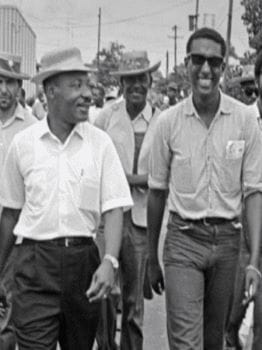Happy Birthday Martin

Before a person becomes a saint, is mythologized, canonized, and most egregiously commercialized as Dr. King, they are just a person. They interact with people as just another person. These interactions provide the greatest opportunity for learning, if the saint had anything to teach in the first place. Dr. Martin Luther King Jr. still has plenty to teach.
Much can be learned from the stories Stokely Carmichael tells in this wonderful interview about his relationship with King and his other experiences as an organizer in the Civil Rights Movement.
Carmichael was brilliantly courageous and at the center of some of the Movement's key struggles. He worked with King shoulder to shoulder for a number of years, always with the “greatest love and respect for King. Anyone who knows Dr. Martin Luther King knows that he loves humanity... working with him I had the experience to see this love manifest itself.”
Carmichael declares, “Our relationship was very strong even where we had political disagreements,” — a political sophistication beyond most American politics today where people carry around checklists. If someone doesn't fill every box, they can't be worked with, are dismissed, and demonized. It’s not politics, it's zealotry, while the Civil Rights Movement was the most democratically sophisticated politics in American history.
One of the great stories Carmichael tells is about King and Vietnam —(starting at 40 minutes, however the whole interview is beautifully invaluable). Carmichael was an organizer with the Student Nonviolent Coordinating Committee (SNCC). “SNCC was the first one to take a position against the war (Vietnam), not only against the war but for the destruction of the draft. My task inside of SNCC politically was to put pressure on King to make him take a stand on the war in Vietnam... We were going to beat him with nonviolence and love. It was clear his philosophy made it impossible for him not to take a stand against the war in Vietnam.”
One example Carmichael tells of trying to get King to come out against the war was “just joking with him, about a brother we both knew.”
Carmichael asks King, “Remember so and so?”
King replies, “Yes, where is he?”
“He got shot!”
“Whhaaat? Where?”
“Vietnam. You didn't tell him not to go in Vietnam, be nonviolent there. You told him to be nonviolent in Mississippi. He didn't got shot there, but he got shot in Vietnam. You should have told him to be nonviolent in Vietnam. That was your problem. You didn't carry your stuff like you say you're supposed to carry it.”
Phew, that is the darkest humor, a knife in King's heart. The story continues, months later Carmichael was in Atlanta and King phoned him asking him to come to his church that Sunday. Stokely replied, “I can always come hear you preach, even though I don't believe in your stuff, you make me tap my feet.”
Then King told him he was coming out against Vietnam. “Between us, there must have been 35 seconds of silence,” then Carmichael replied, “I’m gonna be on the front seat of your church.”
Importantly, he compares the Vietnam speech to how King's peddled today. In 1988, Carmichael stated, “Unfortunately, King is just becoming commercial, people don't know him. They think his 'I Have a Dream Speech' is one of his best speeches, but if you know King, 'I have a Dream' is one of his most vulgar speeches. The Vietnam speech was one of his most profound.”
“King was so honest he could criticize himself publicly and sometimes if you listen to him, the words he used were very sharp. In the speech on Vietnam he has a quote, 'There is a point where caution can become cowardice.' He was speaking about himself.” At a time in America where bellowing ignorance and misinformation is considered political virtue, there is no more saintly act than learning, challenging your wrongly held confidences.
The Vietnam speech is still little known, you never hear it out of the mouths of the political class. A week after Atlanta, King would give the speech in New York. The speech's commentary and understandings would not fit today's commercialization of King, his liberalizing, and most importantly the diminishing of his democratic necessity. Carmichael says, “He used words in that speech I could never use. If was to use those words I would be dismissed as irresponsible – 'The United States government is one of the greatest purveyors of violence in the world today.'”
Also, King states in the speech,
“The war in Vietnam is but a symptom of a far deeper malady within the American spirit, and if we ignore this sobering reality we will find ourselves organizing clergy and laymen-concerned committees for the next generation. They will be concerned about Guatemala and Peru. They will be concerned about Thailand and Cambodia. They will be concerned about Mozambique and South Africa. We will be marching for these and a dozen other names and attending rallies without end unless there is a significant and profound change in American life and policy.”
Well King was wrong. It wasn't the next generation, but generations, and to the list can now be added Afghanistan, Iraq, Libya, Syria, Yemen, Gaza, and Ukraine. It is a list that explicitly proves neither the American political class and most tragically the American people have any understanding of King and his democratic teachings. If Joe Biden did, and wanting to save democracy in America, he'd stop these god damned wars — an act not of a saint, but a human being.
God love Dr. King and Kwame Ture, two of the greatest democrats America ever produced.

